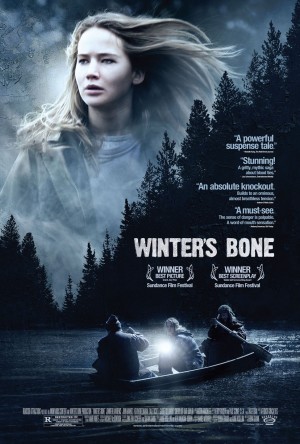These notes may be late to the party, but I just got this first review in my email via Google Alert. It's difficult to believe this description of the movie Winter's Bone, based on the novel by Daniel Woodrell, has anything to do with reality. Prairie Miller seems offbase. I have not seen the film yet, but her review seems to come with baggage as well as simple mistakes. See for yourself:
If then presidential hopeful Obama instigated controversy about red state rural life that he notoriously characterized as bitter primitives clinging to religion and guns, then the dreary Ozarks outing Winter's Bone adds plenty of insult to injury. A nearly anthropological contemptuous take on the already broadly caricatured and barely comprehended so-called hillbilly culture, the film is set apart only by its melodramatic rather than satirical approach.
Seemingly set for release on the successful coattails of that other likewise Sundance award winner venture in exploitative underclass tabloid cinema, Winter's Bone plays out like a seedy and no less cynical white trash version of Precious. Directed and co-written by NYU schooled Debra Granik with a distinct outsider-looking-in perspective as if from another planet, the film plods along in a self-serious sedentary funk, with the characters having little to say beyond what we've heard in SNL skits and similar stereotypical fare, many times before.
Jennifer Lawrence as the sole multidimensional character breathing life into this tedious backwoods travelogue, is Ree Dolly, a seventeen year old holding her disintegrating family together. Dad is a cokehead felon fugitive who put their home up as collateral for bail, and the authorities are about to take the property over and evict them. So Ree desperately divides her time as sole caregiver for her younger siblings, and searching for her wayward parent to stall the eviction, while a barely seen or heard mom is pretty much a stay at home zombie. There's also an assortment of snarling, moronic redneck relatives, submissive women who would never dream of talking back to the menfolk, and unneighborly varmints running interference on Ree's quest, providing her with false leads when not simply beating her to a pulp.
I have read Winter's Bone several times, and it's difficult to believe the filmmakers would shoddify the material as badly as she says. I also mistrust her on basic issues. In reference to "cooking coke?" If you cook coke, does it not turn into crack? Uh, maybe she means meth? Certainly the novel doesn't mention crack or coke, only meth (I just checked). I looked around, though, and found another review by John DeFore that seems more balanced.
PARK CITY — Six years after winning an award here for "Down to the Bone," director Debra Granik returns to Sundance with her follow-up, "Winter's Bone," a grim story of persistence set deep in the Ozarks. Slow to get going and uningratiating, the film will be a hard sell at the boxoffice, but its grit and the tenacity of its young heroine will resonate with some viewers.
That heroine, a high-schooler named Ree Dolly (Jennifer Lawrence), faces a crisis much like that in "Frozen River": A man, in this case Ree's father, has vanished owing debts that put her home in jeopardy. With two younger siblings and a barely-sentient mother to care for, her only option is to scour the backwoods, searching for Dad among the not-distant-enough relatives who (literally and figuratively) litter the county, and whose criminal operations likely have something to do with his disappearance.
"Bone" doesn't supply the same kind of role for Lawrence that Melissa Leo got in "River": Ree's options, stop or keep going, are less dramatic than Ray Eddy's even when continuing her search means talking to volatile people with things to hide. For much of the film, as Ree feeds the family with hand-me-down groceries and teaches the kids to hunt squirrel, Granik seems to believe it's impressive enough that she simply continues to survive.As the action picks up — with some crone-like family gatekeepers giving Ree a beating in hopes of scaring her off — the strong presence of John Hawkes (as the vanished man's drug-addicted brother) keeps the bleak setting from overcoming the movie and gives Lawrence a bit more to play against.
Eventually, even when she's being controlled by events instead of vice-versa, Ree proves worthy to the challenge around her. Whether she'll escape her grim surroundings or simply endure them isn't a question "Winter's Bone" intends to ask.
The film won best screenplay and best picture at the Sundance Film Festival, too, which probably does nothing for its viability in the marketplace, but implies that Prairie Miller might be in the minority. I know I'll be seeing it as soon as I can.






